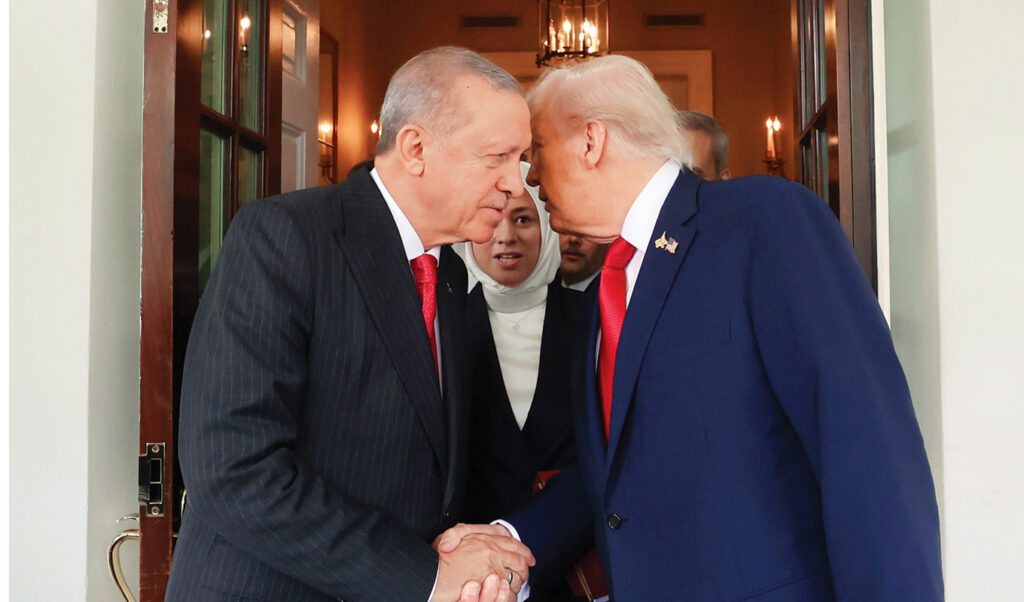An off-the-record conversation became the reason a Turkish journalist lost his job and sparked a major public debate about the real outcome of the Donald Trump – Recep Tayyip Erdogan meeting at the White House. Turkish television network NTV terminated its cooperation with Washington correspondent Hussein Gunay following his comments outside the White House. The decision came after video captured by Associated Press cameras recorded Gunay’s statements in a private conversation.
What was said? The truth. The experienced journalist reportedly said the meeting “didn’t go well for Turkey” and that the US set as a condition for selling F-35 fighters the cessation of Russian natural gas purchases. “Turkey gained nothing from this meeting,” he characteristically commented.
The truth about Trump and Erdogan’s cordiality
The truth is that the cordiality between the two presidents was evident. Equally obvious, however, was that D. Trump wanted to set limits and conditions. The world leader opened a window for the F-35s, but in exchange demanded that Turkey stop buying Russian oil and natural gas. Something that cannot be done either easily or quickly.
Turkey: The factors that will determine fifth-generation fighters
Those who rushed to declare that Turkey would get fifth-generation fighters in the near future either had political motives or underestimated three factors. First, breaking away from Russian energy is not an easy decision for T. Erdogan, as he would risk his relationship with Putin. Second, the Greek-American lobby is determined to block the sale, citing sanctions arising from CAATSA law and exposing Turkish choices (S-400 purchase and threats against a NATO member state) to Congress, which has not yet given the “green light.” Finally, there is the Israel factor. In the current situation, Israelis do not want to have a hostile power next to them that would possess ultra-modern fighters.
Why Turkey will be one step behind Greece with F-35s
Greece, as Foreign Ministry spokesperson Lana Ziohou pointed out, “cannot impose procurement policies on third countries. What it can do is present its positions to its Allies. What we say is that American weapons cannot be used against allied countries.” It is also true that even if Turkey buys the F-35s, it will be one step behind Greece. Our country has already secured 20 fighters, with an option for another 20, and it is estimated that deliveries will begin in 2028. “In case the Turks also get the F-35s, this will remove or balance the power advantage Greece has over Turkey. However, even if they get them, we will get them earlier. That is, we will be prepared and will have ‘assimilated’ them,” explained retired Air Vice Marshal Panagiotis Katsaros.
The fake news about Turkey’s military superiority
In the aftermath of the meeting, several fake news stories circulated about Turkey’s military superiority. Greece is running the F-35 program, has already upgraded 42 F-16s to Viper standard, has secured four Bellara frigates and is considering purchasing two Bergamini frigates from Italy, with the possibility of buying two more. Turkey, on the contrary, faces obstacles: besides the “freezing” of the F-35s, Congress also blocked the export of engines needed for the Turkish KAAN fighter. The revelation was made by Foreign Minister Hakan Fidan.
The many interpretations of the Mitsotakis-Erdogan meeting “shipwreck”
As for the cancellation of the Mitsotakis-Erdogan meeting, reality does not admit many interpretations. The Turkish side’s decision to request postponement four hours before it was to take place constitutes diplomatic impropriety and shows that clouds have returned to Greek-Turkish relations. According to Ms. Ziohou, “the care of this meeting was not the responsibility of the Foreign Ministry.”
Competent sources told “P” that there was Gerapetritis-Fidan communication, without setting a new date for the Supreme Cooperation Council. “Despite disagreements, we want to discuss in order to prevent tensions. All discussions with Turkey take place within the framework of structured dialogue,” she clarified. It is recalled that Greek-Turkish dialogue stumbles over the Turkish casus belli. Kyriakos Mitsotakis from Denmark warned that as long as the casus belli exists, Turkey will not join the SAFE program. The message was also conveyed to NATO Secretary General Mark Rutte.
What Piri Reis shows in the Aegean
As a response to Mitsotakis’ message, Ankara resorted to familiar tactics. It issued a Navtex for “scientific research” by the oceanographic vessel “Piri Reis” in the Aegean (October 4-14), in areas west of Chios and Lesvos, covering sections within the Greek continental shelf. Athens responded with a counter-Navtex from Lemnos station, showing that tension is returning.
Published in Parapolitika




